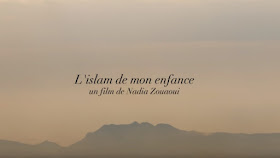Nana Hadiza Akawala
Bibata est partie… (Bibata is gone)
Niger - 2018 - 30 min - Documentary
Description
"Bibata is gone ... is a documentary film that deals with friendship, humanism. The guiding thread or artistic approach chosen to recount this relationship is based on a quest, an exploration. The story, going back more than ten years is about the maid for my family. My friend Bibata lived in the village with her beautiful family. Her husband had left on a voyage and did not send her enough money to support herself and her children. As tradition dictates, the care of Bibata returns to her parents-in-law. Unfortunately, they do not have the means to take on this task. Bibata therefore left her village to look for work in the capital, Niamey, in order to provide for her needs. My family was the first family for which she worked.
Bibata did the common tasks of the household: preparing meals, taking care of the house, sweeping the yard, washing dishes ... Despite the age gap between us (I was between 14 and 15 years old and she was 25), a friendship quickly developed between us…
One day Bibata was recalled to her village by her husband who had returned, with the definite promise to come back in a week. It has been more than ten years since Bibata left and has not been heard from since. Her absence shattered something in me. Her absence left a void around me. Put simply, I missed her. From the suburbs of Niamey to Kobi, I journey to find her.”
(From an interview with Niger Inter)
« Bibata est partie… » est un film documentaire qui traite de l’amitié, de l’humanisme. Le fil conducteur ou la démarche artistique choisi pour raconter cette amitié est basé sur une quête, une exploration. L’histoire de ce film est celle d’une femme de ménage de ma famille communément appelée ‘’bonne’’ et remonte à plus d’une dizaine d’années. Mon amie Bibata vivait au village avec sa belle famille. Son époux était parti en exode et ne lui envoyait pas de quoi subvenir à ses besoins et ceux de ses enfants. Comme le veut la tradition, la prise en charge de Bibata revient alors à ses beaux parents. Malheureusement, cette belle famille ne dispose pas des moyens nécessaires pour assumer cette mission. Bibata a donc quitté son village pour chercher du travail à Niamey, la capitale et ainsi subvenir à ses besoins. La première famille dans laquelle elle a travaillé était la mienne.
Les tâches de Bibata chez moi étaient courantes : préparer les repas, s’occuper de la maison, balayer la cour, faire la vaisselle… En dépit de l’écart d’âge entre nous (j’avais entre 14 et 15 ans et elle 25 ans), il s’est créé très vite un rapport d’amitié voire familial entre elle et moi. La complicité entre nous était telle qu’il n’y avait cette ligne de démarcation, j’allais dire cette distanciation qui fait que la fille de ménage se présente comme l’Autre des membres de la famille malgré ses précieux services à cette dernière.
Un jour Bibata a été rappelée dans son village par son mari revenu de l’exode avec la ferme promesse de revenir dans une semaine. Voilà plus de dix ans que Bibata n’est plus revenue et n’a pas fait signe de vie. Son absence a brisé quelque chose en moi. Son absence a laissé un vide autour de moi. Elle me manquait tout simplement. Des faubourgs de Niamey à Kobi, je pars à sa recherche.
(D’un entretien avec Niger Inter)
https://www.nigerinter.com/2018/04/cinema-bibata-est-partie-de-nana-hadiza-akawala-lunivers-des-femmes-de-menage/)
Biographie | Biography
Nana Hadiza Akawala from Niger, obtained her Master 2 in documentary filmmaking at Gaston Berger University (UGB) in Saint Louis, Senegal. She also holds a Master 2 in Marketing and International Business Management. She was Director of Television Bonferey and Secretary General of the National Centre of Cinematography of Niger (CNCN). She is currently working at the Ministry of Cultural Renaissance of the Arts and Social Modernisation.
Nana Hadiza Akawala est de nationalité nigérienne. Elle a obtenu son Master 2 en réalisation de film documentaire (bac +5) à l’Université Gaston Berger (UGB) de Saint Louis au Sénégal. Elle est également titulaire d’un Master2 en Marketing et Management des Affaires Internationales (MMAI). Elle fut Directrice de la Télévision Bonferey et Secrétaire Générale du Centre National de la Cinématographie du Niger (CNCN). Elle travaille présentement au Ministère de la Renaissance Culturelle des Arts et de la Modernisation Sociale.
Source & Images : Niger Inter

























